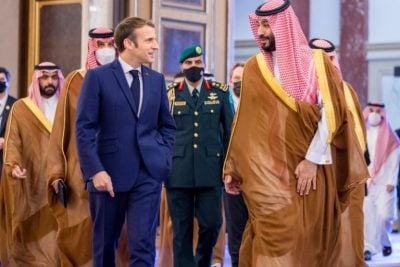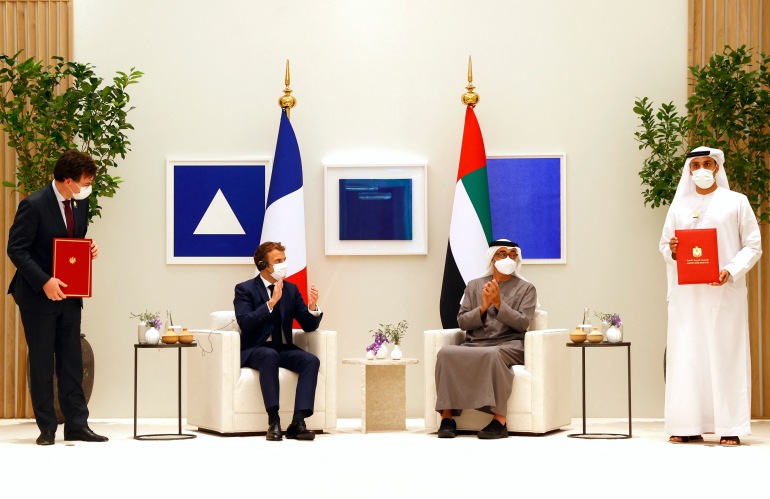Macron’s Revenge for AUKUS Betrayal

All Global Research articles can be read in 51 languages by activating the “Translate Website” drop down menu on the top banner of our home page (Desktop version).
To receive Global Research’s Daily Newsletter (selected articles), click here.
Visit and follow us on Instagram at @crg_globalresearch.
***
What distinguishes great powers like France is their sense of history and their profound understanding of the temporality of historical experience — or, how their past, present, and future are thought to be connected in their international diplomacy.
That is why the AUKUS pact between the US, UK and Australia was a catastrophic mistake. Australia can be forgiven for being an inconsequential third-tier nation, but the US and Britain should have known that France will duly settle scores when the time comes.
And it has come in the most unexpected way as French President Emmanuel Macron hit the Anglo-Saxon axis in West Asia where it hurts most — in the United Arab Emirates and Saudi Arabia.
Macron wrapped up a diplomatic coup of mammoth proportions in securing a $19 billion contract for 80 French-made Rafale fighter jets, the biggest international order ever made for the warplanes, during a visit to the UAE on December 3.
The arms deal includes 80 Rafale fighter jets and 12 military helicopters. The deal will directly support 7,000 jobs in France and guarantee the supply chain of the Dassault Aviation until the end of 2031, a French official told journalists. Shares in Dassault Aviation SA, the Rafale’s maker, rose more than 9 percent.
Yet, this is much more than a “stand-alone” business deal. For, Macron has tapped the impatience in the Emirati mind over President Biden’s hesitancy in approving an F-35 deal amid concerns about Abu Dhabi’s relationship with China, including the prevalence of Huawei 5G technology in the country.
The Biden Administration is sitting on the UAE’s F-35 stealth fighter deal that formed something of an adjunct to the so-called Abraham Accords on the establishment of diplomatic relations between Tel Aviv and Abu Dhabi, that gave former president Donald Trump a foreign-policy triumph in West Asia in the final days of his term in office.
In April, a US state department spokesman said about the $23 billion deal, “We can confirm that the administration intends to move forward with these proposed defence sales to the UAE, even as we continue reviewing details and consulting with Emirati officials to ensure we have developed mutual understandings with respect to Emirati obligations before, during and after delivery… we anticipate a robust and sustained dialogue with the UAE to (ensure) any defence transfers meet our mutual strategic objectives to build a stronger, interoperable, and more capable security partnership.”
The Biden Administration added a caveat that the UAE must roll back its robust ties with China and impose restrictions on where, and under what circumstances, the F-35s can be used.
Plainly put, UAE will pay a fortune to buy the F-35 but its usage will be under American control and, secondly, it may not even be the most advanced version of the newly-developed fighter aircraft (which Israel got).
If the UAE leadership felt humiliated, it didn’t show its feelings. But the new thinking in the UAE regional policies lately speaks for itself. The Rafale deal can be compared to Turkey’s deal with Russia for S-400 missiles after the US prevarication over Ankara’s interest in Patriot missiles. The UAE too has turned away from the US to other sources for purchase of advanced weaponry, without strings attached.
France has weakened the US’ pressure tactic. Amidst the Gulf Arab states’ growing uncertainty about the US’ focus on the region, the Élysée Palace said in a statement, “This contract cements a strategic partnership that is stronger than ever and directly contributes to regional stability.”

President Macron and Abu Dhabi’s Crown Prince Mohammed bin Zayed Al Nahyan (R) are presented with the Rafale agreement
Secretary of State Antony Blinken had a call with with UAE Crown Prince Sheikh Mohammed bin Zayed Al Nahyan on Sunday. The state department readout said they “discussed important regional matters, reaffirmed their countries’ strong partnership and discussed ways to broaden and deepen their wide-ranging cooperation.”
Truly, Blinken has egg on his face. Within a fortnight or so of his initiative to form an exclusive West Asian grouping (dubbed as “Quad.2”) with Israel, UAE and India, lo and behold, Abu Dhabi has moved in a contrarian direction toward normalising with Syria, Turkey and Iran (all of whom are not on talking terms with the US and/or Israel.)
By the way, the rulers of Syria, Turkey, Iran, the UAE and Saudi Arabia also have something special in common — all five of them have been excluded from Biden’s guest list of 110 invitees to his “Summit of Democracy” on December 9-10.
Biden’s snub must be hurting. With only three days to go for Biden’s summit, the UAE National Security Advisor Sheikh Tahnoun bin Zayed Al Nahyan, who is also the brother of the Crown Prince, is travelling to Tehran at the invitation of Ali Shamkhani, secretary of Iran’s Supreme National Security Council and advisor to Supreme Leader.
The Tehran Times reported that “Enhancing mutual ties and sharing views on the latest developments in the region are among the main objectives of the top UAE security official’s visit to Tehran.”
Of course, AUKUS pact killed a much bigger deal involving the sale of 12 diesel-powered French submarines to Australia worth US$36.5 billion. But, for Macron, the Rafale deal with the UAE may be the beginning only with more surprises to follow.
From Abu Dhabi, Macron headed for Saudi Arabia for a meeting with the Saudi Crown Prime Mohammed bin Salman. The symbolism was overpowering. Macron became the the first major western leader to visit Saudi Arabia and meet Crown Prince Mohammed bin Salman since he was implicated in the murder of Jamal Khashoggi three years ago.
“Prince Mohammed received Macron at a royal palace in Jeddah, where they shared a long handshake. Saudi media and influencers swiftly disseminated a photograph of the two men smiling and walking side by side, ” Bloomberg reported.
While cementing France’s position in the Persian Gulf, Macron is also signalling that France can serve as an alternative to the US in West Asia amidst growing talk among Gulf states for easing their reliance on Washington. He discussed with Prince Mohammad an initiative to resolve the political crisis in Lebanon.
Biden entered the White House condemning Saudi Arabia as a “pariah” state over human rights abuses and vowed that he wouldn’t deal with the Crown Prince.
But Washington has lately begun backtracking, realising the imperative need to engage with Riyadh on many of their policy goals, especially the energy markets. A White House delegation travelled to Riyadh last week on the eve of the Opec+ meeting on Thursday seeking more oil supply to cool prices that fed rising inflation in the US.
With Macron on the prowl, Biden is coming under pressure to swallow his pride and speak with the Saudi Crown Prince who is the de facto ruler. That may be the ultimate price he has to pay for the AUKUS betrayal meted out to France.
*
Note to readers: Please click the share buttons above or below. Follow us on Instagram, @crg_globalresearch. Forward this article to your email lists. Crosspost on your blog site, internet forums. etc.
Featured image: Saudi Crown Prince Mohammed bin Salman (R) greets French President Emmanuel Macron upon his arrival in Jeddah, Dec 4, 2021 (All images in this article are from Indian Punchline)

